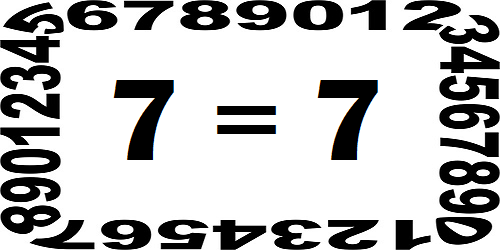October 13, 2011.
Why is seven so frequently used in Revelation and all Scripture? Does Scripture reveal why? Or, do we need to ponder Deut. 29:29: “the secret things belong unto the Lord our God: but those things which are revealed belong unto us.”
The argument in favor of symbolic meanings of numbers goes like this:
1) Admittedly, Scripture nowhere gives symbolic meaning to any number.
2) But, when a number is repeated so many times, there must be a reason.
3) The way to find the reason is to examine each context.
Since “seven” is the most repeated number in the Bible, one writer said that seven is “the keystone on which the symbolism of numbers depends.” So, let’s examine the keystone.
Some scholars point out that “seven” and “swear” are related words in Hebrew. They conclude that when a Hebrew swore an oath, he “sevened” it. But Gen. 21:30-31 is the only text offered where swearing is connected to seven. As a matter of fact, lists of symbolical meanings for seven seldom include anything about swearing. Rather, we are told that seven symbolically indicates completeness, totality, perfection, fulfillment, divine rest, God’s number, sanctity, divine agency, God at work, etc., etc. These can be reduced to two major ideas: divinity and completeness.
Some say seven represents God at work. Others, God at rest. The contradiction is a result of different contexts. But, in yet other contexts, seven is not related to divinity at all. Satan is presented as a dragon with seven heads (Rev. 12:3, 9). Rome is depicted as a beast with seven heads (Rev. 13:1). In Matt. 12:45, we read of “seven other spirits more wicked than himself.” It simply is not true that seven necessarily represents divinity.
As for perfection or completeness, some contexts of seven are related to these qualities. But, again, the contrary is also true. Some, without thinking, refer to seven days of creation; but God actually completed His perfect work in six days. Look it up. The book of Revelation was written to seven churches in Asia. Complete? No. The Asian church of Colossae is not named. Then there is Peter, who seemed to think seven was the complete and perfect number of times to forgive. But, in Matt. 18:22, Jesus told Peter he was 483 times short! By the way, to be honest, most of us would have a very difficult time forgiving three or four times.
Someone offered me Prov. 6:16 as a case “where seven may mean somewhat more than a literal seven.” In a sense, that is true, as long as we remember that a number is a number. It speaks of “six… yea, seven” sins that God hates. In this context, the seven things are neither divine, nor is the list complete. God hates all sins. Mark 7:20-22 lists 13 sins; Rom. 1:29-31 lists 23. “Six… yea, seven” is simply an attention-grabbing mode of expression, not at all requiring seven items. In the first two chapters of Amos, it is “for three… and for four” reiterated 8 times. These are all limited lists, none intended to be complete.
Ruth 4:15 reads “better to you than seven sons,” while 1 Sam. 1:8, says, “better to you than ten sons.” The meaning is identical. Specific numbers put more “life” into the expression than does the bland “many.” We talk the same way: “I told you a dozen times.” It is still a number, a matter of quantity, simply meaning, “I told you lots of times.” My English dictionary gives one meaning of a dozen as “an indefinite number; a great many.” Whereas “dozen” is often used that way in English, “seven” was commonly used that way among the Hebrews. But an “indefinite number” is still a number.
It is admitted on all hands that there is no book, chapter, and verse giving to any number a non-numerical meaning? Giving non-numerical meanings to numbers in Revelation is more destructive than helpful. See Insights 158 and 125. Yes, it has pleased God to make an abundant use of seven. However, it has not pleased God to give us any reason. Frequency of seven or any word does not grant us permission to change its meaning. Why is seven so frequent? “The secret things belong unto the Lord our God.”
